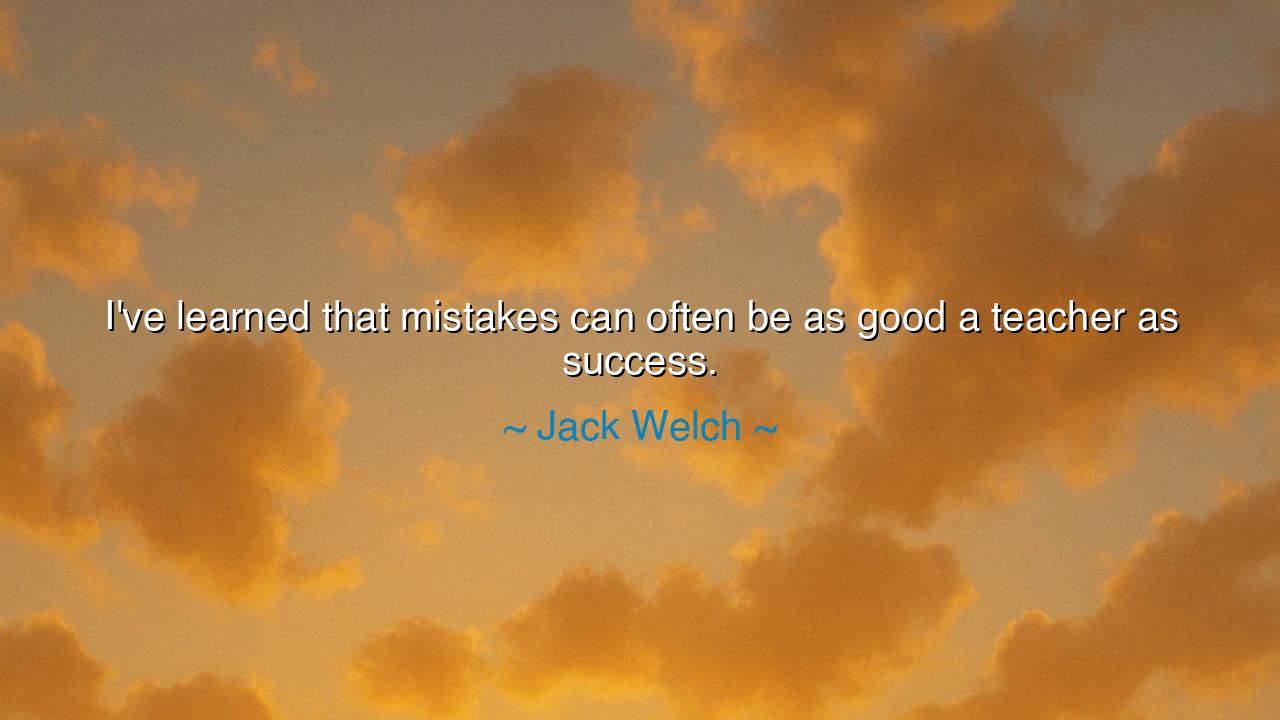
I've learned that mistakes can often be as good a teacher as






“I’ve learned that mistakes can often be as good a teacher as success,” declared Jack Welch, a man who rose to guide one of the greatest companies of his age. His words are not meant only for the halls of commerce, but for the very soul of human life. For what is a mistake but a hidden lesson wrapped in difficulty, a stern master whose rod strikes us only to awaken our slumbering wisdom? And what is success, if not the flowering of knowledge already gained? To embrace one and reject the other is folly, for both are needed in the great schooling of the soul.
In the language of the ancients, one might say: “The forge is not merciful to the metal, yet by its fire the sword is made strong.” In the same way, mistakes burn us, humble us, and reveal our weaknesses, but through that fire we are shaped into something greater. Success may comfort us, may bring us joy, but it seldom stirs us to change. The sweetness of victory fills the heart, yet the bitterness of failure engraves itself upon the memory, forcing us to adapt, to improve, to rise once more. Thus, failure is not the enemy of growth, but its fiercest ally.
Consider the tale of Thomas Edison, who sought to capture light itself within a filament. Again and again he failed—hundreds, even thousands of attempts collapsed into darkness. Yet he did not despair. He declared, “I have not failed, I have simply found ten thousand ways that do not work.” Every mistake taught him a new truth, every broken experiment became a guidepost. And at last, the world was changed by a small bulb glowing in the night. His success was built entirely upon the back of his failures. Without the teacher of mistakes, the gift of light may never have come.
History abounds with such lessons. The great general Hannibal crossed the Alps with elephants, a feat unmatched, but his brilliance was not enough to conquer Rome. He learned too late that strategy without supply, courage without patience, can undo the mightiest of plans. His mistakes became warnings for the generations of soldiers that followed, teaching them that valor alone cannot win empires. Here, even in loss, the hand of wisdom was at work, carving lessons into the stone of time.
The essence of Welch’s teaching is this: do not curse your mistakes, nor despise the pain of failure. Instead, look into them as into a mirror, for there you will see clearly what must be changed. Many men, upon tasting defeat, retreat into despair, never to try again. But the wise man bows to the rod of error, learns its secret, and rises renewed. If success is the harvest, mistakes are the plowing of the field—painful, yes, but necessary for fruit to grow.
Therefore, let the seeker of wisdom embrace both paths. When you fall, ask: “What has this moment come to teach me?” When you succeed, ask: “How can I honor the steps that brought me here?” In this way, both joy and sorrow become companions, both loss and victory become guides. For the man who learns from all things is undefeatable, since even failure bends to his advantage.
As for practical counsel: keep a record of your mistakes as diligently as you record your triumphs. Reflect on them with honesty, not with shame. Speak of them openly, for others may learn through your scars as well as through your laurels. And when you rise again, do so with gratitude—not only for the triumph, but for the fall that shaped the triumph. This is the discipline of the strong, the path of those who do not waste their pain.
Remember this, O children of the future: the world honors success, but the wise honor learning. And learning comes most deeply from error. Therefore, walk boldly, and do not fear the stumble—for every stone upon which you trip may become the very foundation of your strength.






AAdministratorAdministrator
Welcome, honored guests. Please leave a comment, we will respond soon